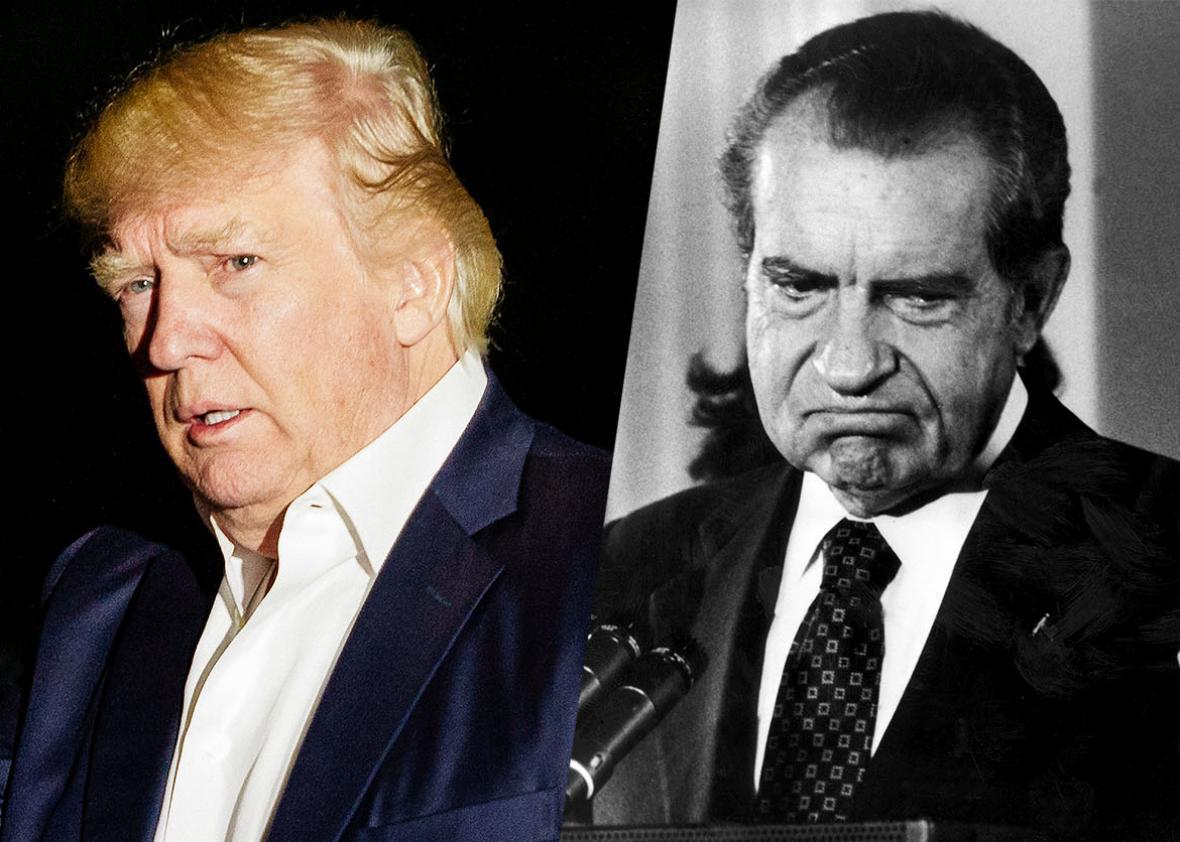On Tuesday, President Trump fired James Comey, the director of the FBI, whose agency is overseeing an investigation into possible ties between the Trump campaign and Russia. To discuss Trump’s decision, and whether it has Nixonian parallels, I spoke by phone with historian John A. Farrell, the author of the new book Richard Nixon: A Life. During the course of our conversation, which has been edited and condensed for clarity, we discussed the details of the Saturday Night Massacre, Nixon’s mental state during the Watergate scandal, and the importance of bipartisanship to keeping the executive branch in check.
Isaac Chotiner: As a historian of Nixon, what do you make of the comparisons we have been hearing today to Nixon’s Saturday Night Massacre?
John A. Farrell: There are two big differences. One is that Trump is Trump, and this could just be Trump being Trump. And the other is that the House and the Senate are controlled by the Republican Party, and so we may never find out what happened. The actions that the president and his staff have taken, their behavior, mirrors that of Nixon and his staff when they were frantically trying to cover up felonious behavior, including in the president’s case, obstruction of justice. But up to this point, we don’t have any clear proof or evidence that this is something more than just politics—that it is a matter of law. So it would seem to me that the logical thing to do to restore confidence in the integrity of the government would be to have a Select Committee with the Democrats having real influence, or having Attorney General Sessions appoint a special counsel, as he has the power to do, to investigate whether this is Trump being Trump or Nixonian.
Tell me a bit more about the specifics about how the Saturday Night Massacre went down.
One of the interesting things about the Saturday Night Massacre is that both Alexander Haig, the president’s chief of staff, and Elliot Richardson, the attorney general, thought they had reached an agreement. And in fact, the bones of one agreement were submitted to Howard Baker and Sam Ervin of the Watergate Committee and were OK’d by them. The idea was something along the lines of having a judge or a senator listen to the Watergate tapes and decide whether or not they were incriminating and whether to go forward with them.
Behind all of that, however, was this burning desire by the president to dismiss [special prosecutor] Archibald Cox, because Cox had gone into areas that ranged far beyond the Watergate break-in. He was going into Nixon’s business relations and looking at the use of funds on Nixon’s properties. He was going into the Republican Party’s use of campaign funds. Nixon was as outraged as subsequent presidents would be by the way independent counsels took their brief and expanded it to find any kind of a crime to justify their existence. So in some ways the grounds for a compromise seemed to be available, and in other ways Nixon’s behavior made a compromise impossible.
What is the biggest difference between Washington in 1973 and Washington today?
I think there is far more cynicism now. The fact that you can have presidents blatantly lying the way Trump does. Nixon had to craft his lies in a way that Americans would believe it. Trump just says whatever he believes his base will find somewhat logical or believable or can hang their hat on. Everyone treats the system with incredible cynicism. You also had people then like Lowell Weicker and Howard Baker on the Republican side, and several members of the House Judiciary Committee who saw a duty to government and not to “our team is the good guys and your team is the bad guys and screw you.”
How would you describe Nixon’s mental state at the time of the massacre? Was he being paranoid and crazy, or behaving as a rational actor pursuing his only route of self-preservation left?
By the accounts of Kissinger and some of the telephone transcripts that have survived, it is clear that Nixon by October of 1973 was in a very stressed-out state and in fact had a series of crises: Spiro Agnew resigning to escape prison, the Yom Kippur War and the Soviets’ use of that to expand their toehold in the Middle East, and then the firing of Cox and the firestorm which came after it. And then the series of revelations that were as damaging as the massacre, including the gap in the tapes and whether he was using federal funds on his homes. There is ample evidence. Kissinger talks about Nixon being loaded and calling him sounding semi-hysterical and saying essentially, “They are out to kill the president and I may physically die.” You have Brezhnev in Washington saying they should pull back, because the president is going off the deep end and we don’t want to start a war. Even real Nixon defenders like his daughter Julie, and Billy Graham, concede Nixon was drinking more. There is a recent study where they examined Nixon’s calendar and found that he was becoming more and more remote from the job. There was definitely aberrational behavior from the president of the United States.
Looking back on the reaction in 1973 to the massacre, what are hopeful signs, going forward, that we live in a healthy society?
I think you would have to see Mitch McConnell and enough members of his caucus—and I am not sure if this is possible—come out and stand at a press conference with [Chuck] Schumer and appoint a select committee with Democrats which had subpoena power and staff. This isn’t just about Comey; this is about whether the 2016 election was somehow tainted. This is serious baseline stuff, and it needs to be looked at. It’s frustrating and astonishing that you don’t have a serious, independent look at it.
